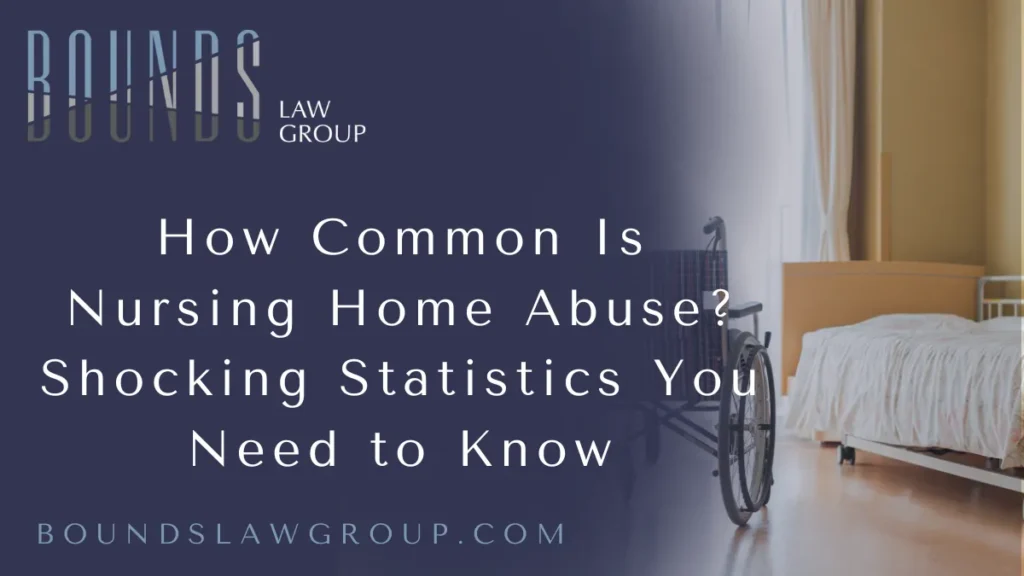
Nursing home abuse is a growing concern across the United States. Many families place their loved ones in nursing homes with the expectation that they will receive quality care and attention. Unfortunately, nursing home abuse statistics reveal that a significant number of elderly individuals are subjected to mistreatment, neglect, and harm while residing in these facilities.
In this article, we will explore the disturbing facts surrounding nursing home abuse, the prevalence of this issue, and the long-term effects it has on its victims. We will also discuss the legal options available to those who have experienced abuse and how Bounds Law Group can help you pursue justice. Contact us now at 877-644-5122 or complete the free case evaluation form for expert legal assistance.
Nursing Home Abuse Statistics: A Growing Problem
It is essential to address the startling reality that nursing home abuse is more common than most people realize. According to recent studies, nearly 1 in 3 nursing homes in the U.S. have been cited for abuse violations. These violations range from physical assault to emotional distress and neglect, highlighting the vulnerability of residents in these facilities.
The nursing home abuse statistics also show that approximately 2 million elderly Americans are affected by abuse each year. This includes not only physical abuse but also financial exploitation, sexual abuse, and emotional abuse. Sadly, many of these cases go unreported, as victims are often too frail or afraid to speak out against their abusers.

Types of Nursing Home Abuse: Physical, Emotional, and More
The most common types of nursing home abuse can be broken down into various categories, each with its own distinct impact on the victims.
Physical Abuse
Physical abuse includes any form of physical violence toward a nursing home resident, such as hitting, slapping, or pushing. Nursing home abuse statistics show that physical abuse accounts for a large portion of the reported incidents. Victims may suffer broken bones, bruising, or even severe injuries that can lead to permanent disabilities or death.
Emotional and Psychological Abuse
Emotional and psychological abuse can be just as damaging as physical abuse, if not more so. This type of abuse includes verbal insults, threats, humiliation, and intimidation. According to recent nursing home abuse statistics, nearly 15% of elderly residents suffer from some form of emotional or psychological abuse. These experiences can lead to anxiety, depression, and severe emotional trauma that lasts long after the abuse has occurred.
Neglect
Neglect occurs when nursing home staff fail to provide adequate care and attention to residents. This can include leaving residents in soiled clothing for extended periods, not providing proper nutrition or hydration, or failing to administer necessary medications. Neglect is often difficult to detect, as it may not leave visible physical marks. However, it can lead to serious health complications, including malnutrition, infections, and untreated medical conditions.
Sexual Abuse
Sexual abuse in nursing homes is a particularly disturbing form of mistreatment. The nursing home abuse statistics indicate that 1 in 6 women and 1 in 14 men experience some form of sexual abuse during their time in a nursing home. The perpetrators can range from staff members to other residents, and victims often suffer from emotional and physical trauma as a result.
Financial Exploitation
Financial exploitation occurs when nursing home residents are coerced or manipulated into giving away their money or assets. This form of abuse often involves fraudulent activities such as identity theft, unauthorized credit card charges, or the theft of personal property. Elderly individuals, particularly those with dementia or cognitive decline, are especially vulnerable to financial exploitation.
Shocking Facts About Nursing Home Abuse: What You Need to Know
The statistics surrounding nursing home abuse are alarming and should not be ignored. The prevalence of this abuse is higher than many people assume. Consider the following shocking facts:
A Majority of Elderly Abuse Victims Suffer in Silence
According to the National Center on Elder Abuse, nearly 50% of elderly abuse cases in nursing homes are never reported. This is due to several factors, including fear of retaliation, cognitive decline, or a lack of awareness about what constitutes abuse. Victims often remain silent, unable to express their pain or fear, which makes it difficult for families and authorities to identify and address the abuse.
Staffing Shortages Contribute to Abuse and Neglect
The nursing home abuse statistics show that one of the leading causes of abuse and neglect is understaffing. In many nursing homes, there are simply not enough trained professionals to provide the level of care that residents need. As a result, staff members may become overwhelmed, which can lead to neglect, emotional outbursts, or even physical abuse. It’s critical to address staffing shortages to improve the overall quality of care for elderly residents.
Abuse is More Likely to Occur in For-Profit Facilities
Studies have shown that for-profit nursing homes are more likely to experience abuse and neglect than non-profit or government-run facilities. For-profit facilities often prioritize profit over patient care, leading to cost-cutting measures that can negatively impact the residents. As a result, these homes tend to have higher rates of abuse, neglect, and staff turnover.
How Can You Protect Your Loved One from Nursing Home Abuse?
While nursing home abuse statistics paint a grim picture, there are steps you can take to protect your loved ones. Here are some ways to reduce the risk of abuse and ensure that your family members receive the care they deserve:
Do Your Research
Before placing a loved one in a nursing home, thoroughly research potential facilities. Look at state inspection reports, online reviews, and ratings from reputable organizations. This will help you determine whether the facility has a history of abuse or neglect and whether it is a safe place for your loved one.
Visit Regularly
Frequent visits to the nursing home can help you monitor your loved one's condition and the quality of care they are receiving. Pay attention to their physical and emotional health, as well as the attitudes and behavior of the staff members.
Know the Warning Signs of Abuse
Be vigilant and watch for warning signs of abuse. These may include unexplained injuries, sudden changes in behavior, emotional withdrawal, fear of certain staff members, or a lack of communication with family members. If you notice any of these signs, report them immediately to the appropriate authorities.

What Should You Do If You Suspect Nursing Home Abuse?
If you suspect that your loved one is a victim of nursing home abuse, it is essential to act quickly. Here are the steps you should take:
- Document the Abuse: Record any signs of abuse or neglect, including photos of injuries or notes about unusual behavior. This documentation will be crucial if you decide to pursue legal action.
- Report the Abuse: Contact the nursing home administration and report your concerns. If necessary, escalate the issue to state agencies that handle elder abuse.
- Seek Legal Help: Contact Bounds Law Group to speak with an experienced attorney who can help you navigate the legal process. We will help you file a claim, pursue compensation, and ensure that justice is served.
If you suspect abuse or neglect, don’t hesitate to take action. Your loved one deserves protection, care, and respect.
Contact Us for Help
If you or a loved one has been a victim of nursing home abuse, you are not alone. Bounds Law Group is here to help you seek justice. We offer a free case evaluation form to assess your situation and provide expert legal advice.
Call us now at 877-644-5122 or complete the free case evaluation form today.
Sources
- National Center on Elder Abuse
This organization provides a comprehensive overview of elder abuse and offers valuable resources for families dealing with abuse cases.
National Center on Elder Abuse - Centers for Disease Control and Prevention (CDC)
The CDC offers data and research on nursing home abuse, its prevalence, and its impact on public health.
CDC Elder Abuse Resources - American Association of Retired Persons (AARP)
AARP provides advocacy and resources to help protect elderly individuals from nursing home abuse and neglect.
AARP Elder Abuse Resources

